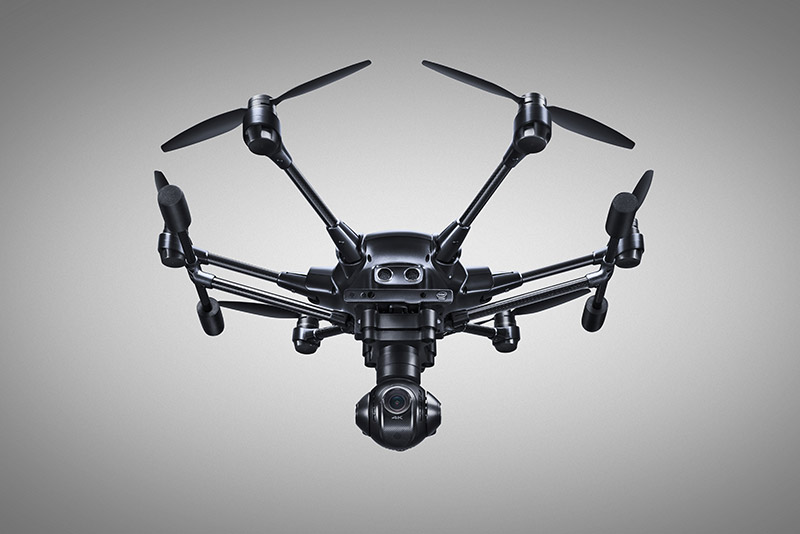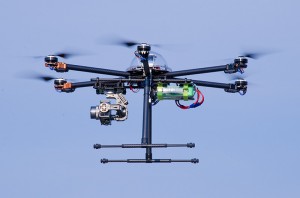

As a drone pilot myself, I found this quite maddening to see a quadcopter flying over yesterday’s 4th of July event in my home town of Sandy, Utah. There must have been 50,000 people there. The quad was a Phantom with prop guards. The pilot made countless flights over the crowd, even at night during the fireworks display.
With all the police and fire people there I first assumed the pilot had a permit. He was launching from next to the stage where the band was performing, and hand-catching the Phantom on landing.
 As the night wore on though, I started getting more and more irritated. I thought to myself that there would be no way the FAA would permit this type of flight. I watched him fly up to the stage then fly backward. He seemed to lose control and freak out when he almost hit the spotlight crane which was situated in the middle of the audience.
As the night wore on though, I started getting more and more irritated. I thought to myself that there would be no way the FAA would permit this type of flight. I watched him fly up to the stage then fly backward. He seemed to lose control and freak out when he almost hit the spotlight crane which was situated in the middle of the audience.
 I was irresponsible with my first drone, a Phantom. It was back in 2013 and I had no idea what I was doing or what might happen if I crashed. I’m much more careful now and watching this guy fly over the audience, my wife and 3-year old included, ticked me off.
I was irresponsible with my first drone, a Phantom. It was back in 2013 and I had no idea what I was doing or what might happen if I crashed. I’m much more careful now and watching this guy fly over the audience, my wife and 3-year old included, ticked me off.
The pilot looked to be an event photographer. If he was shooting for the event or for the band, I’d assume he had a Section 333 commercial exemption and/or a permit to do it. Benefit of the doubt. But again, methinks someone who has gone to all the trouble getting a 333 wouldn’t fly over a crowd of thousands.
Typhoon H with Intel RealSense Technology Improves Safety, Allows More Creative Options with Intelligent Obstacle Navigation

ONTARIO, Calif. (June 22, 2016) — Yuneec International, the world leader in electric aviation, today announced the award-winning Typhoon
H with Intel RealSense Technology is now available for preorder at a suggested retail price of $1,899.
First shipments to customers will begin within four weeks. Customers will receive their Typhoon H with a factory installed Intel RealSense
R200 Camera and Intel Atom ™ processor, an ST16 controller with a Wizard controller for dual operator mode, two batteries, and extra
propellers, all packed in a custom designed backpack. Most recently demonstrated live at CES Asia, Intel RealSense Technology enables
Typhoon H to fly autonomously, intelligently navigating around objects, taking safety and customers’ creative options to the next level.
As installed on Typhoon H, the Intel RealSense R200 Camera and the quad core Intel Atom processor module work seamlessly with the flight
control firmware to add intelligent obstacle navigation. With a combination of specialized cameras and sensors, this Intel system maps and
learns its environment in 3D, recognizing each obstacle, planning an alternative route and safely navigating around it. This is a major
advancement over ultra-sonic collision prevention, which automatically stops Typhoon H short of obstacles, but cannot model the environment
or intelligently reroute around obstacles. The module also adds downward facing sensors to improve stability, enabling flight indoors or
outdoors close to the ground, even with poor GPS reception.
“Intelligent navigation and obstacle avoidance in complex environments powered by Intel RealSense Technology expands creative possibilities
and enhances safety for our customers,” said Yu Tian, chief executive officer of Yuneec International. “Now, users can confidently operate
Typhoon H with RealSense Technology in a wide variety of environments that previously required highly-technical piloting.”
Intel and Yuneec announced a $60M investment in August of 2015 for product collaboration. The first collaboration was to power the ST16
ground station, which employs the Intel Atom processor. The second product collaboration comes to market by way of Intel RealSense
“At Intel, we’re always looking to open up creative possibilities through technology,” said Anil Nanduri, Intel’s vice president and general
manager of unmanned aviation systems within the New Technology Group. “By equipping the Yuneec Typhoon H with Intel RealSense
Technology, drone pilots can worry less about obstacles that may impede those creative possibilities, and focus more on their flight path and
Yuneec announced the expansion of its Typhoon series with the unveiling of Typhoon H at the 2016 CES in Las Vegas. Typhoon H is
equipped with six rotors and a 360-degree gimbal, which allows unlimited panning for breathtaking 4K videos and 12 megapixel stills with the
all-new CGO3+ camera. In addition, the landing gear retracts during flight to seamlessly remove itself from the shot for unobstructed views.
Typhoon H also has a variety of flight and image capturing modes, including Point of Interest, Orbit Me, Curve Cable Cam, Journey Mode, and
Team Mode for film and photography teams. Innovative new safety features include ultrasonic proximity detection to assist in avoiding large
obstacles, which is operational when Intel RealSense Technology is inactive, and a six-rotor safety failsafe system, which allows Typhoon H to
remain stable and land if a motor should fail.
A separately available Intel RealSense Technology module for Typhoon H owners will be released in the near future.
Typhoon H is designed with the creative consumer in mind, with features such as user-friendly design, including quick disconnect props that
allow speedy removal from the motors, and rotor arms that quickly fold down for easy and compact transportation using a custom-designed
backpack. Carbon fiber is used extensively to decrease weight while increasing durability. Typhoon H comes with the professional quality
Android-based ST16 controller, which has a large 7-inch integrated touchscreen display and HD 720p video downlink for stunning real-time
video reception, a great improvement on having to connect an iPad or iPhone to a separate controller.
Typhoon H with Intel RealSense Technology is available for $1,899 at retailers and online at www.yuneec.com.
 I just read an interesting AP article stating that new FAA rules for commercial drone flights are expected as early as TODAY, the 21st of June 2016.
I just read an interesting AP article stating that new FAA rules for commercial drone flights are expected as early as TODAY, the 21st of June 2016.
The Federal Aviation Administration is expected to announce as early as Tuesday the creation of a new category of rules for drones weighing less than 55 pounds. The long-anticipated rules would mean drone operators would be able to fly without special permission.
Personally I’ve been avoiding filing for an FAA 333 exemption (the current commercial approval by the FAA) because I don’t have the money for an attorney to draft one up, nor do I have the time or desire to wait six months to a year for a response. As a result, I’ve simply not pursued commercial endeavors with my drones.
The summary says operators must register their drones online and pass an aviation knowledge exam for drone pilots at an FAA-approved testing center. That would give them a drone pilot certification that’s good for 24 months. Operators must also present identification for a security vetting similar to that applied to general aviation pilots.
Hopefully new and sensible rules will make it easier for people like me to dive into aerial photography, aerial videography, thermography, mapping, or other areas drones are great for. Looking forward to these new rules asap!